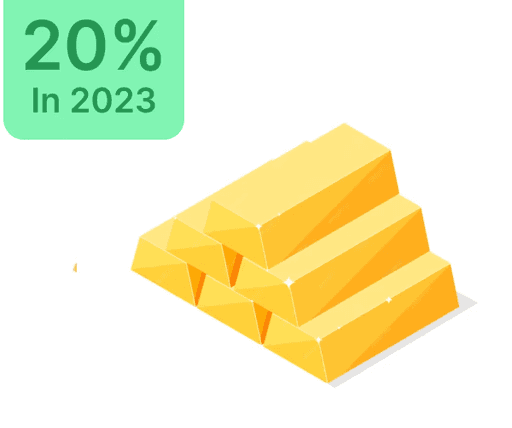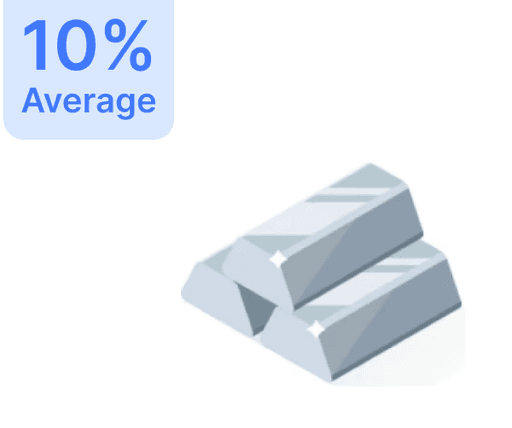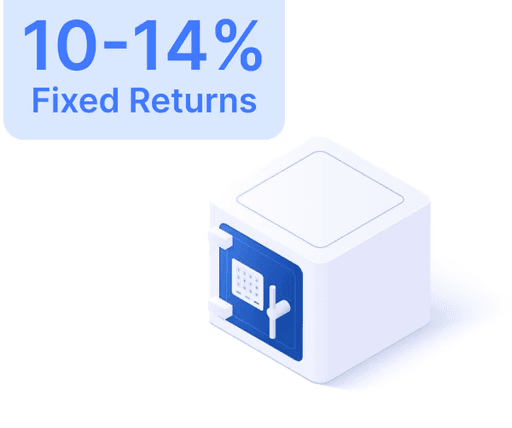
Mutual Funds

 Jun 11, 2024
Jun 11, 2024Introduction
Mutual funds are collective investments managed by professional fund managers. They are traded on exchanges and give investors access to a diverse range of assets chosen for the fund. A professional fund manager oversees these investments, and the fund's assets and objectives are outlined in the prospectus. For individuals who contribute to their mutual funds through payroll deposits, these funds offer automatic investing and reduced investment risk compared to purchasing individual stocks, thanks to their diversified holdings.
How Are Earnings Calculated for Mutual Funds?
Investors typically earn returns from a mutual fund in three ways:
- Dividend/Interest Income: Mutual funds distribute the dividends from stocks and the interest from bonds held in their portfolio. Investors usually have the option to either receive these distributions as a check or reinvest the earnings to purchase additional shares in the mutual fund.
- Portfolio Distributions: If the fund sells securities that have appreciated in value, it realizes a capital gain. Most funds pass these gains on to investors through distributions.
- Capital Gains Distribution: When the value of the fund's shares increases, investors can sell their mutual fund shares at a profit in the market.
When evaluating the returns of a mutual fund, you will often encounter the term "total return." This figure represents the net change in value (either positive or negative) over a specific period and includes any interest, dividends, or capital gains generated by the fund, along with the change in its market value during that period. Total returns are typically provided for one, five, and ten-year periods, as well as from the fund's inception date.
Types of Mutual Funds
There are over 8,700 mutual funds in the U.S., categorized mainly into four types: stock, money market, bond, and target-date funds.
- Stock Funds: These funds primarily invest in equities or stocks. Subcategories include:
- Company Size: Small-cap, mid-cap, and large-cap funds, based on the market capitalization of the companies they invest in.
- Investment Approach: Aggressive growth, income-oriented, and value funds.
- Geographical Focus: U.S. stocks or foreign equities.
- Value Funds: Invest in undervalued stocks aiming for long-term appreciation.
- Growth Funds: Focus on companies with strong earnings, sales, and cash flow growth.
- Blend Funds: Combine growth and value stocks for a balanced risk-reward profile.
- Bond Funds: These funds invest in fixed-income securities like government and corporate bonds. They aim to provide consistent returns with limited risk. Some actively managed funds seek undervalued bonds for higher returns, though with increased risk.
- Index Mutual Funds: Designed to mirror the performance of a specific index, such as the S&P 500. They have lower research costs, resulting in fewer fees for investors, and often outperform actively managed funds.
- Balanced Funds: Invest in a mix of stocks, bonds, money market instruments, or alternative investments to diversify risk. The allocation strategy is detailed in the fund's prospectus, and portfolio managers may adjust the asset mix to maintain the fund's strategy.
- Money Market Mutual Funds: Invest in low-risk, short-term debt instruments like government Treasury bills. They offer modest returns, typically higher than a savings account but lower than a CD. These funds are often used for short-term cash holdings or emergency funds.
- Income Funds: Aim to provide a steady income stream by investing in government and high-quality corporate debt. These funds are popular for retirement investing, focusing on generating interest income.
- International Mutual Funds: Invest in assets outside the investor's home country. Global funds invest worldwide, providing diversification. They carry risks related to political instability and currency fluctuations but can balance lower domestic returns.
- Regional Mutual Funds: Focus on specific geographic areas, such as a continent or a group of countries with similar economic characteristics. Examples include Europe-focused funds or emerging market funds. They offer growth potential but carry unique risks like political instability.
- Sector and Theme Mutual Funds: Target specific economic sectors, such as technology or healthcare, or themes like AI. These funds can be volatile, as stocks in the same sector often rise and fall together.
- Socially Responsible Mutual Funds: Invest in companies that meet ethical criteria, avoiding industries like tobacco or weapons. Sustainable funds focus on green technology. They consider environmental, social, and governance factors in their investment choices.
Mutual Fund Fees
When investing in mutual funds, it's crucial to understand the associated fees, as they can significantly impact your returns over time. Here are some common mutual fund fees:
- Expense Ratio: This annual fee covers the fund's operating expenses, including management fees, administrative costs, and marketing expenses. It is expressed as a percentage of the fund's average net assets and is deducted from the fund's returns. Over the last 30 years, mutual funds have reduced their expense ratios significantly due to competition from index and exchange-traded funds (ETFs) and other market changes. For instance, in 1996, equity mutual fund investors incurred expense ratios of 1.04% ($1.04 for every $100 in assets). By 2022, this average had decreased to 0.44%. Bond mutual funds had slightly lower expense ratios at 0.37%, while hybrid models, which often require more management, averaged 0.59%.
- Sales Charges or Loads: Some mutual funds impose sales fees, known as "loads," when you buy or sell shares. Front-end loads are charged when you purchase shares, while back-end loads (or contingent and deferred sales charges) are assessed if you sell your shares before a specified date. However, some management firms offer no-load mutual funds, which do not have commission or sales charges.
- Redemption Fees: Certain mutual funds charge a fee when you sell shares within a short period (usually 30 to 180 days) after purchasing them. The U.S. Securities and Exchange Commission (SEC) limits this fee to 2%. This fee is intended to discourage short-term trading to maintain fund stability.
- Other Account Fees: Some funds or brokerage firms may charge additional fees for maintaining your account or conducting transactions, particularly if your balance falls below a certain minimum.
How To Invest in Mutual Funds
Investing in mutual funds is relatively straightforward and involves the following steps:
- Check Employer Options: Before buying shares, check with your employer to see if they offer additional mutual fund products. These options might come with matching funds or offer tax advantages.
- Brokerage Account: Ensure you have a brokerage account with sufficient funds to purchase mutual fund shares.
- Identify Suitable Funds: Find mutual funds that align with your investing goals, considering factors such as risk, returns, fees, and minimum investment requirements. Many platforms provide fund screening and research tools to help with this.
- Investing Amount: Decide how much you want to invest and submit your trade. You can often set up automatic recurring investments if desired.
- Monitor Performance: While mutual funds are typically long-term investments, you should periodically check the fund's performance and make adjustments as needed.
- Closing Your Position: When you decide to sell, enter a sell order on your platform.
Advantages Of Mutual Fund Investment
- Diversification: Diversification involves mixing different investments and assets within a portfolio to reduce risk. One of the key advantages of mutual funds is their ability to diversify quickly and cost-effectively compared to purchasing individual securities. A well-diversified portfolio includes securities from various industries and companies of different sizes, as well as bonds with varying maturities and issuers.
- Easy Access: Mutual funds trade on major stock exchanges, allowing them to be bought and sold with relative ease, making them highly liquid investments. For certain asset types, such as foreign equities or exotic commodities, mutual funds are often the most practical—and sometimes the only—way for individual investors to participate.
- Economies of Scale: Mutual funds offer economies of scale, reducing transaction costs compared to buying individual securities. They also facilitate dollar-cost averaging, where investors regularly contribute a fixed amount regardless of market conditions. Because mutual funds trade in large volumes, their transaction costs are lower than what individual investors would pay. Additionally, mutual funds can invest in assets or take larger positions that smaller investors might not be able to.
- Professional Management: Mutual funds provide access to professional investment managers who utilize research and skilled trading strategies. For a relatively low cost, small investors can benefit from having a full-time manager oversee their investments. Mutual funds typically have lower minimum investment requirements, making professional money management accessible to individual investors.
- Transparency: Mutual funds are regulated to ensure accountability and fairness for investors. The components of each mutual fund are readily available across various platforms, allowing investors to research and select funds with different management styles and goals. Fund managers might focus on value investing, growth investing, developed or emerging markets, income, or macroeconomic strategies. This variety enables investors to gain exposure to a wide range of assets, including stocks, bonds, commodities, foreign assets, and real estate, through specialized mutual funds.
Drawbacks of Investing in Mutual Funds
While mutual funds offer benefits like liquidity, diversification, and professional management, there are several drawbacks to consider:
- No FDIC Guarantee: Mutual fund investments are not guaranteed by the FDIC. Like many other investments, there is always a risk that the value of your mutual fund may decrease. Equity mutual funds, in particular, experience price fluctuations similar to the stocks within the fund's portfolio.
- Cash Drag: Mutual funds must hold a significant portion of their portfolios in cash to satisfy daily share redemptions. This necessity to maintain liquidity means mutual funds often have a larger percentage of their portfolio in cash compared to other investors. Since this cash does not generate returns, it creates a "cash drag."
- Higher Costs: Regardless of the fund’s performance, mutual funds charge fees that reduce your overall returns. These fees can accumulate and compound over time, particularly in actively managed funds where transaction costs are higher. It is important to pay attention to these fees to avoid significant costs.
- Dilution: Successful funds that grow too large may experience dilution. When new money floods into a well-performing fund, the manager might struggle to find suitable investments for the additional capital, potentially impacting returns.
- SEC Requirements: The SEC mandates that at least 80% of a fund's assets must be invested in the type of investment implied by its name. However, the criteria for this 80% can be broad and vague, leading some fund managers to use misleading fund titles. For instance, a fund focused narrowly on Argentine stocks might be marketed under a more general name like "International High-Tech Fund."
- End-of-Day Trading Only: Mutual funds allow you to request share conversions to cash at any time, but unlike stocks and ETFs, mutual fund transactions only occur at the end of the trading day.
- Taxes: When a mutual fund manager sells a security, a capital gains tax is triggered, which may be passed on to you. Unlike ETFs, which avoid this through their creation and redemption mechanism, mutual funds do not have this advantage. To mitigate tax impact, you can invest in tax-sensitive funds or hold non-tax-sensitive mutual funds in tax-deferred accounts, such as a 401(k) or IRA.
Are Mutual Funds Safe Investments?
All investments carry some level of risk, including stocks, bonds, and mutual funds. The specific risk associated with a mutual fund depends on its investment strategy, the assets it holds, and the expertise of its manager. Unlike bank deposits, money invested in mutual funds is not insured by the FDIC or any other entity.
What Are The Tax Implications of Mutual Funds?
Investing in mutual funds comes with tax implications, including taxes on capital gains and dividend distributions, as well as taxes on capital gains or losses when you sell your shares. Your tax liability depends on the type of mutual fund, how long you hold the investment, and whether the fund is in a tax-advantaged account. Using tax-efficient funds and holding investments in tax-advantaged accounts can help reduce your tax burden. However, it's important to consult a tax professional for advice tailored to your situation.
What Are the Risks of Mutual Funds?
Mutual funds come with various investment risks, depending on the assets they hold. Key risks include:
- Market Risk: The potential decline in the value of the securities within the fund, impacting overall returns.
- Interest Rate Risk: Relevant to funds holding bonds and other fixed-income securities. Rising interest rates can cause bond prices to fall.
- Management Risk: Linked to the performance of the fund's management team. Poor investment decisions by the managers can negatively affect your returns.
Investors should carefully review the fund's prospectus and assess their own risk tolerance and investment objectives before investing.
Conclusion
Investing in mutual funds offers a range of benefits, including diversification, professional management, and easy access to a variety of asset classes. However, it's important to be aware of the potential drawbacks, such as fees, tax implications, and various investment risks. By understanding these factors and carefully selecting funds that align with your financial goals and risk tolerance, you can make informed decisions that enhance your investment strategy. Always consider consulting with a financial advisor to tailor your investments to your personal circumstances and objectives.
FAQs
What are the main benefits of investing in mutual funds?
Mutual funds offer diversification, professional management, and easy access to a variety of asset classes. They also provide economies of scale and liquidity, making them an attractive option for both novice and experienced investors.
What fees are associated with mutual funds?
Common fees include the expense ratio, sales charges or loads, redemption fees, and other account maintenance fees. These fees can impact your overall returns, so it's important to understand them before investing.
Are mutual funds safe investments?
While mutual funds are generally considered a safer investment compared to individual stocks due to diversification, they still carry risks such as market risk, interest rate risk, and management risk. Mutual funds are not insured by the FDIC.
What are the tax implications of investing in mutual funds?
Investing in mutual funds can lead to taxes on capital gains and dividend distributions, as well as capital gains or losses when selling shares. The tax impact depends on the type of fund, your holding period, and whether the fund is held in a tax-advantaged account.
How can I minimize the risks associated with mutual funds?
To minimize risks, thoroughly research and select funds that align with your investment goals and risk tolerance. Regularly review the fund's performance, understand the management team's strategy, and consider consulting a financial advisor for personalized advice.




